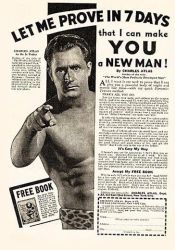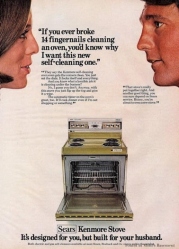
WHY IS it so interesting to trace the history of things? Is because it gives our time more meaning? A sense of place? Of progress? Probably all of those and many more, which is why, for example, it’s great to see pictures of ourselves through the ages, of a self that no longer exists, but which has evolved into who we are now. On a shorter time-scale, we are not the same person we were yesterday even, but reminiscing is a powerful thing. Let’s take a trip down Copywrite Lane…
In terms of communication, of marketing, it’s similarly interesting to go through the past of copywriting and advertisements. They tell us a lot about the progress of technology, science, and especially societal norms, of what was tolerated and what no longer is, and what wasn’t but is now; from cocaine elixirs, doctors endorsing cigarettes, blatant racism, to sexism and sex.

Words are free, and potentially exceptionally powerful. Yet we learn the classic playground saying of ‘stick and stones may break my bones but names will never hurt me’ young. Too young to realise it’s all three. Often those words form the most brutal of attacks, ones that can linger and be carried for all our days while a cut or bruise are impermanent. The press is so powerful because they tell us what words they want us to see/hear. And there’s a reason many countries have strict press regulation – usually for the worse.
Words change the course of history. On a micro level they influence your life. On a macro level, they can change societies for good or bad. Sometimes, it’s very easy to forget that. And in advertising, that is never forgotten, because the right combination of words, perhaps accompanied by images, can sell, while poor copy won’t.

Moving with the changes, copywriting has become a different animal. Once existing only in print, then radio, to TV and the web, it’s had to respond to new media types, divergent consumption, as well as a world that’s (I imagine) unrecognisable from even decades ago let alone the 1800s.

Classic copywriting had a catchy strapline, with additional text. There’s something quaint about them now. They are effective and I think deserve a comeback. People operate on a far more visual level than ever before. Reading a paragraph on why an Aga cooker is the best is almost laughable as a concept unless in a review. But words haven’t lost their power, we’re simply drowning in an electric nicotine storm, an onslaught, thanks especially to mobiles in every pocket.
We often think of ourselves as adnostic, that we aren’t influenced to buy X over Y, but somewhere in that brain choices are being made whether we know about them or not.





Ever watched Mad Men? There’s a good example of how the business has evolved. Being a copywriter for the past ten years, I often smile thinking how my job is nothing like those 50’s careers. I’m definitely thankful not to live in that sexist era, but I do wish there was still that appreciation of words, instead of what this job has turned into. “Brief! Keep it brief!” “Nobody wants to read…” (RME)
LikeLiked by 1 person
I have. I imagine a lot of people entered advertising on the back of it.
I think that long copy and the simplistic type is due a comeback…but maybe attention spans are so destroyed long copy just wouldn’t work.
Plus dwindling print readership 😐.
Thanks for dropping by.
LikeLiked by 1 person
Short attention spans – the virus that’s killing readers 😔
LikeLiked by 1 person
Yeah, sadly.
I’m interested to see how it pans out in a few decades.
Probably not good?
LikeLike
This post makes me want to be a copywriter.
LikeLiked by 1 person
Do it 🙂
LikeLiked by 1 person
Interesting history. A pleasure and informative read. Thanks for posting it.
LikeLiked by 1 person
I’d live to dig into the archives and really see what some of the earliest ads looked like from centuries ago, and when ads really took off. Another post perhaps 👍
LikeLike
An interesting insight into the topic. I remember some of the Charles Atlas ads [feeling my age???]
LikeLiked by 1 person
Haha. They clearly made their mark because they’re still remembered today.
LikeLike
As a copywriter, I found this very amusing, especially since I actually love finding the origin of words and sayings. This also made me think of Mad Men. Wordings have changed, but the intention hasn’t.
LikeLiked by 1 person
Glad you enjoyed it.
I’m always fascinated by word origins too and how sayings that have no relevance in todays world have circulated and still abide like ‘an axe to grind’.
And that’s cool I’m looking to get into copywriting myself in the near future.
LikeLiked by 1 person
Copywriting can be neat if you have an interesting subject. And, some jobs allow a little creativity when you write.
LikeLiked by 1 person
Thanks for taking us on this journey. Yes, we like to think of ourselves as “adnostic”, but we’re just kidding ourselves.
Love the modern ad! 😀
LikeLiked by 1 person
Most welcome 🙂
Somewhere in the brain we can’t always quite control, is where we decide on what to buy…mysterious and fascinating..And possibly scary.
All feeds into the idea of free will too.
LikeLiked by 1 person
The brain is so complex and fascinating.
LikeLiked by 1 person
To trace the history of something is a fundamental way to understand things. On a personal level, we wonder how we got to where we are. On large scale we study the history of the earth, all 4 and a half billion years of evolution, not to mention the evolution of our cosmos.
LikeLiked by 1 person
Very true.
Although arguably one of humanities gravest mistakes repeatedly is to ignore what’s gone before and fail to learn.
LikeLike
Interesting post 😁
LikeLiked by 1 person
Cheers 🙂
LikeLiked by 1 person